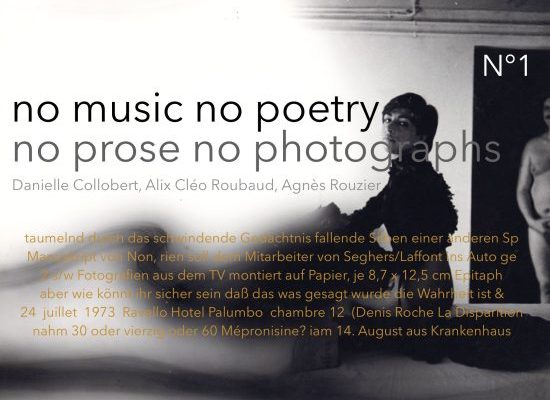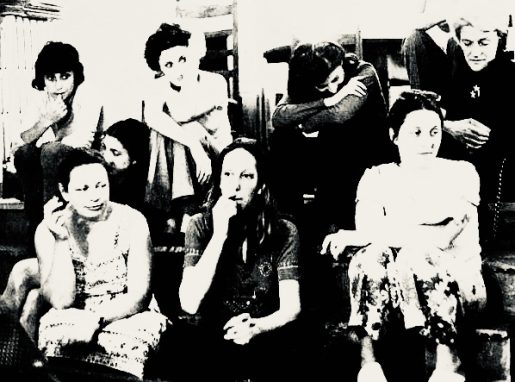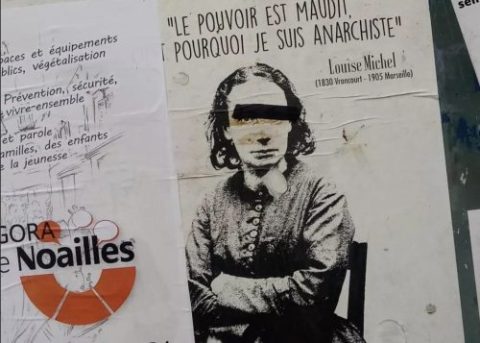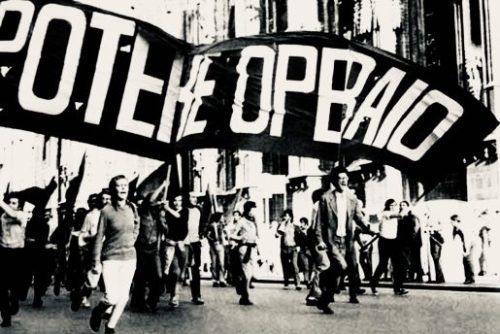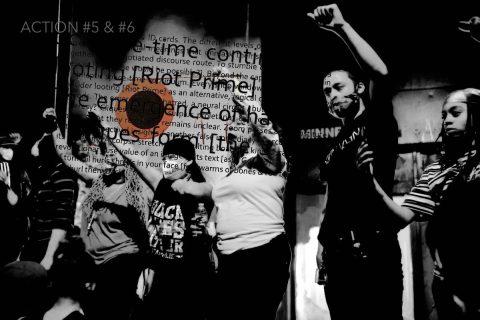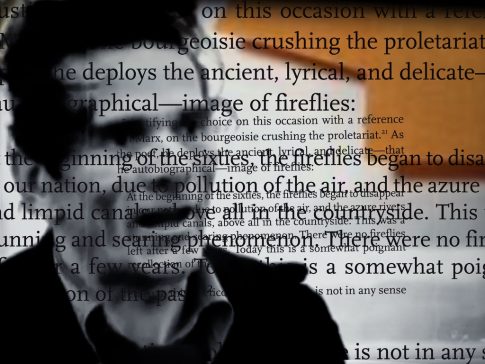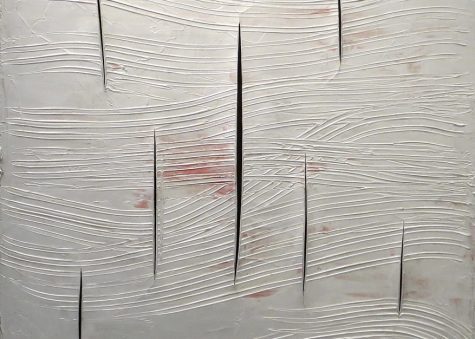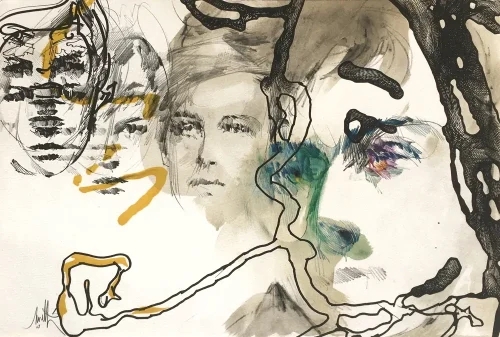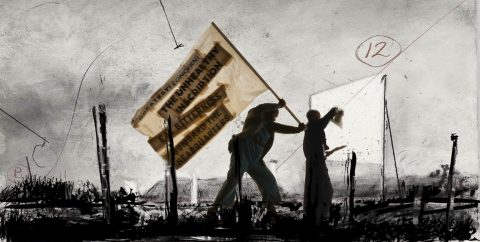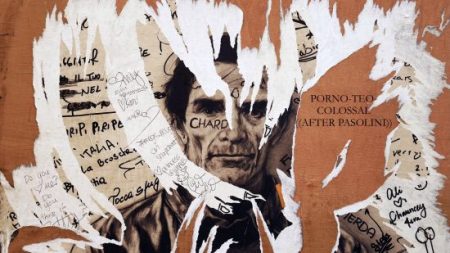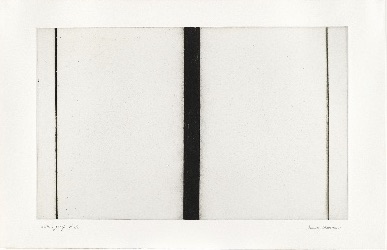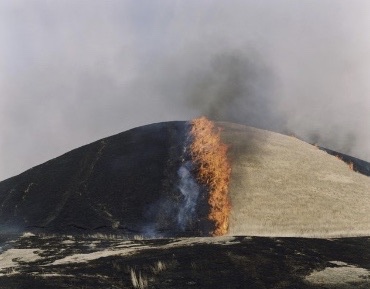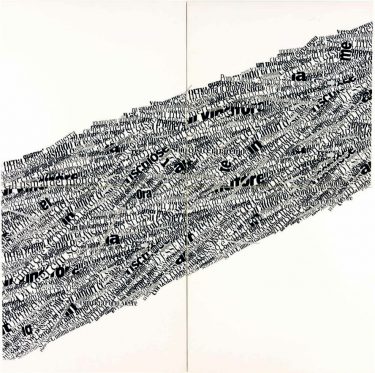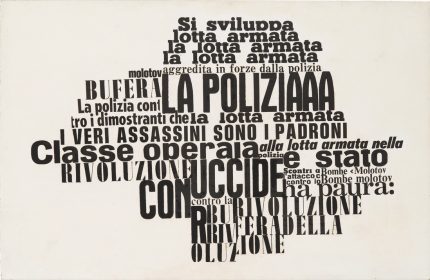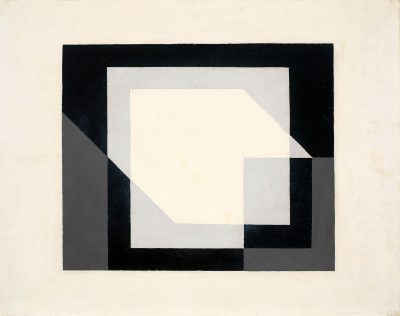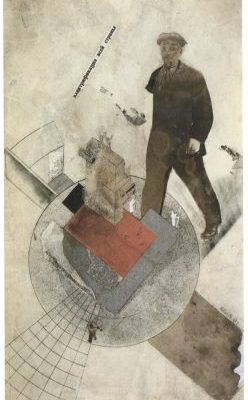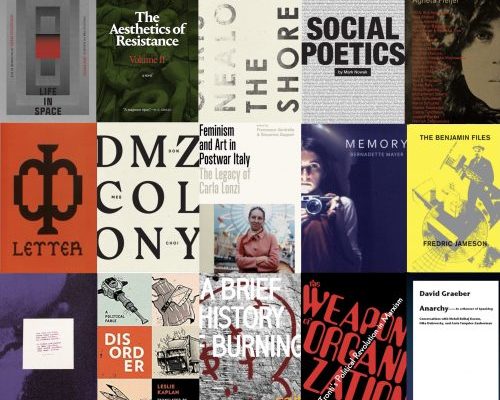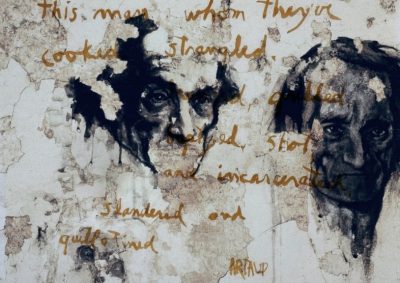Liberté. Danielle Collobert découvrant 30 ans avant Taros le concept de «pâte». // diese Aneignung [Appropriation] ist keineswegs skandalös das die «Bewegung» si // von Dichtern der negativen Moderne sich in Raquel Ateliers in Malakoff trafen // Arme an den Körper geschmiegt Wangenknochen die hervortreten Schläfen li // 947 Fotografie von Denise Colombo 43,5 x 36 cm; Sammlung André S. Labarthe
Blog
no music no poetry no prose no photographs [Danielle Collobert, Alix Cléo Roubaud, Agnès Rouzier] N°2
wenn Schreiben & Fotografie miteinander verbunden sind dann durch die Zeit // Ist Mord (Meurtre) nicht der Bericht Colloberts über den Mord an ihrer Identität // vom 26.5.1943 über die Nummerierung der Sterbeurkunden der Konzentrats // Auflösung moralischer Werte gesellschaftlicher Heuchelei Falschaussagen Sadi // ist jetzt sinnlos ihr eigener Tod naht nicht mehr mit Literatur zu tun er ist die absolute // wären Berge außer daß die Luft darüber auch schwarz ist: schwarz wie Rauch di //
no music no poetry no prose no photographs [Danielle Collobert, Alix Cléo Roubaud, Agnès Rouzier] N° 1
taumelnd durch das schwindende Gedächtnis fallende Silben einer anderen Sp // Manuskript von Non, rien wird dem Mitarbeiter von Seghers/Laffont ins Auto ge // 2 s/w Fotografien aus dem TV montiert auf Papier, je 8,7 x 12,5 cm Epitaph // aber wie könnt ihr sicher sein daß das was gesagt wurde die Wahrheit ist & 24 juillet 1973 Ravello Hôtel Palumbo chambre 12 (Denis Roche La Disparition
Abigail Lang | The Ongoing French Reception of the Objectivists
The ties between French and American poetry are ancient and profound. In the introduction to his 1984 The Random House Book of XXth Century French Poetry, Paul Auster reminds his anglophone reader of the perennial contribution of the French language in general and French literature and poetry in particular to its British and later American counterparts, going back to John Gower and Chaucer. Focusing on the modern period, he claims that “American poetry of the past hundred years would be inconceivable without the French.” From the time of Baudelaire “modern British and American poets have continued to look to France…
Nathalie Quintane | – Danielle Collobert – Et la victime et le bourreau (lecture de Dire I et II).
Ces lignes reviennent de loin – d’il y a longtemps, très longtemps, en un temps presque oublié et dont il ne reste rien, en un temps où de jeunes gens, coupables de n’avoir eu que quelques mois ou quelques années pendant la guerre (celle de 39), prenaient pour modèles les rares opposants au nazisme del a dite guerre, tentant à leur tour de susciter un combat et une résistance dignes de ce nom, en un temps où les collectifs d’intellectuels issus de la bourgeoisie se structuraient comme les Brigades de choc de la Coopérative agricole de Production n° 9…
SCHIBBOLETH
Die Hölle ist nicht der Ort des Schmerzes. Sie ist der Ort, wo man leiden läßt. Sie ist nicht das ÜBEL. Das ÜBEL hat seinen Platz in uns. Wir können der Hölle nicht als Ort dienen. —Edmond Jabès: Dantes Hölle 1 das Kilodrama ist eingetreten* (in alle Richtungen: Passierscheine und Losungen (versteckte Codes, Chiffren und dog whistle) / algorithmisch aufgeladene Echokammern / ein Präzedenzfall oder ganz gewöhnlicher Bluff 2 heute (Montag, 9. Oktober) Transkriptionen eines Teils der Welt / alles kommt zurück, entzifferbar, alles ficht dich an / — »Come . . . le stelle«…
Announcing Tripwire 19: in memory of Sean Bonney, Diane di Prima, Jack Hirshman, Bernadette Mayer, Etel Adnan, Kamau Braithwaite & Keith Waldrop
Tripwire 19 is out now! A Sean Bonney Tribute Portfolio and other contributions, including my text dreaming of one thing [subversive chronicle] Belén Roca, translated by Noah Mazer, Adelaide Ivánova, translated by Chris Daniels, stevie redwood, Cait O’Kane, Mau Baiocco, Peter Bouscheljong, translated by Jonathan Styles. Zheng Xiaoqiong, translated by Zhou Xiaojing, Mayamor, translated by Eric Abalajon, Afrizal Malna, translated by Daniel Owen, Jorge Carlos Fonseca, translated by Shook, James Goodwin, Amalia Tenuta. Don’t say “Rest in Peace,” say Fuck the Police: A Sean Bonney Tribute Portfolio, featuring: Katharina Ludwig, Lama El Khatib & Haytham El Wardany, Anahid Nersessian, Vicky Sparrow,…
Gilles Deleuze | Three Questions About Six fois deux (Godard)
Cahiers du Cinéma has asked you for an interview, because you’re a “Philosopher” and we wanted to do something philosophical, but more specifically because you like and admire Godard’s work. What do you think of his recent TV programs? Like many people, I was moved, and it’s a lasting emotion. Maybe I should explain my image of Godard. As someone who works a great deal, he must be a very solitary figure. But it’s not just any solitude, it’s an extraordinarily animated solitude. Full, not of dreams, fantasies, and projects, but of acts, things, people even. A multiple, creative solitude….
riots and/or poetics [9/2023]
there are the hunters & the hunted. the missing link. before the appearance of monsters. that apocalyptic orange stream of light. 45 degrees at 5 am despite this rain. brain images. the white spots that become part of the images. transformations in response. of the social imaginary. guerilla tactics. codes & alien signs. something that wants to be more than sound or sight. the countertendency of véga/lyotard & souyri [le marxisme qui n’a pas fini, esprit, janv. 1982, 6, p.11-31] or the super-macho stuff of general creativity. as fiction becomes reality. there are no distractions. exactement de la même manière. along the…
Art, life and labour: Carla Lonzi’s existential feminist critique; by Giovanna Zapperi
Any attempt to give an account of the histories of feminism and art in Italy in the second half of the twentieth century inevitably stumbles upon the figure of Carla Lonzi (1931–1982), a renowned art critic throughout the 1960s, who would later become the most emblematic figure of Italian feminism. Lonzi’s intellectual and political trajectory is marked by her withdrawal from the art world in 1970, as she founded the radical feminist group Rivolta Femminile (Feminine Revolt) with Italian artist Carla Accardi and African-Italian journalist Elvira Banotti. Her feminism is therefore defined by a radical negativity, which expresses itself…
invisible relations
:: translated by mathilda cullen they say i was having a wank in the royal parks. gunfire is a streetplan, i say. so is marx. so the type of equotations they call pistol-whips. sean bonney in june 1935, shortly after midnight, when most of the delegates had already left the huge salle de la mutualité, paul eluard delivered a speech written by andré breton at the “international writers’ congress in defense of culture” in paris. it was a reckoning with an increasingly degenerate policy of the french communist party, which had been reduced to an auxiliary wing…
Nathalie Quintane | “I want poetry to be detonated like a bomb!”
Nathalie Quintane is among the most known experimental poets of France. To quote her from what she writes about herself in the French government’s publications website, this is what she writes- “My name is still Nathalie Quintane. I have not changed my date of birth. I still live in the same place. I am few in number but I am determined.” Nathalie belongs to the generation of post 60s French literary activists. Rupak Bardhan Roy: Let me start by asking, what is literature to you and what is poetry? Are they one and the same thing? Nathalie Quintane: (Thinks a…
communism of spirits/documents #1 — #3
:: translated by mathilda cullen communism of spirits/document #1 (the bright work) imec, fonds althusser, alt2.a23.03-01. i have always heard the breathing of my comrade. the telluric shock. résonne dans la conscience commune**. suivi la cabale des dévots. and the perception of the body as an awkward place of extreme instability. the stacking of inner forms of thinking. horribly stretched time. contradictions, gaps, & aporias. that solemn pulsating below. the fatally factual word. quand il eut passé le pont, les fantômes vinrent à sa rencontre* [nosferatu, de murnau]. but no one has access to the hierarchy…
communismus der geister / dokumente #1 – #3
communismus der geister / dokumente #1 (das helle werk) imec, fonds althusser, alt2.a23.03-01. das atmen des gefährten habe ich stets vernommen. die tellurische erschütterung. résonne dans la conscience commune*. suivi la cabale des dévots. auch die wahrnehmung des körpers als unbehaglichen ort massloser instabilität. die aufstapelung innerer formen des denkens. grauenhaft gedehnter zeit. widersprüche, lücken & aporien. das selbständig pulsierende darunter. das tödlich faktische wort. quand il eut passé le pont, les fantômes vinrent à sa rencontre* [nosferatu, de murnau]. aber niemand hat zugriff auf hierarchie und struktur unbewußt…
Sean Bonney | die allmende (translated by Mathilda Cullen)
Satz 1 der kuckuck ist ein schöner vogel sie trillert wie sie fliegt Der Kuckuck ist ein – KNALL – er war ein riesenfreak die parzen hüllten seinen hagel und schießwesen, seine pronomen & seinen geist ein: irgendeine doku anschauen waagen, worte schlichen sich an, trällert als sie – geld mit einsicht gleichsetzen, das wort ‘träumerei’ verwendet sauber wie ein eingetauchter heiliger- ess ich nicht dieses brot / gestern war ich noch tot Meine person wurde genommen war nicht deine, wer heimlich meine kleinen schenkel & die britische anarchistische bewegung blieb drinnen: halt, magnetisches meer…
My poems ACTION #1 – #4 were translated into Greek by Jazra Khaleed for TEFLON # 29
TEFLON # 29 Introduction: Peter Bouscheljong: Μικρή ποιητική της εξέγερσης Ο Γερμανός ποιητής επιχειρεί να συγκροτήσει μια γενεαλογία της «ποιητικής της εξέγερσης» από τον Ρεμπό και τον Μποντλέρ μέχρι τον Αρτό και τον Παζολίνι, από τον Μαγιακόφσκι μέχρι την Άννα Μέντελσον και τη Μιγιό Βεστρίνι. Αναζητά τη «σύνθεση πολιτικής και ποίησης», επιχειρεί να καταστήσει ορατό «ό,τι εξαναγκάστηκε στην αορατότητα», υποστηρίζει ότι «η συγγραφή ενός λογοτεχνικού έργου προϋποθέτει την απόρριψη αυτού του κόσμου, την άρνηση κρυφών συμφωνιών». Μετάφραση: Jazra Khaleed
K Za Win | Poems
A letter from a jail cell Dear Father, the River, whose stomach was cut open, has declared war on our tiny house on the bank, hasn’t she? Right in front of the house you must be looking out for someone who will help you with embankment poles to straighten the river, to fill her holes with sandbags. In the murky water, which rises like a bamboo lance, you must be gazing at the sesame plantation — laden with fruits ready for harvest. You must be thinking a fistful of rice in your mouth is about to be fingered…
Heiner Müller | Pier Paolo Pasolini, Fragment to Death & Memo 409
Pier Paolo Pasolini Fragment to Death I come from you and go to you, A feeling born with the light, with the heat which aroused the first cry as joy I, baptized and known as Pier Paolo, at the beginning of a restless epic: I walked into the light of history but was always heroic under your dominion: my being you my innermost thought. In your path of light, in the horrific uncertainties of your flame, the course of the world, of history: and in your light it truly existed, it lost life so as to win it back:…
Socialisme ou Barbarie | by Claire Pagès
In 1946 some of the members of the French section of the Fourth International (Trotskyist), including Cornelius Castoriadis and Claude Lefort, formed a grouping on the basis of a critique of orthodox Trotskyism: this was the “Chaulieu-Montal tendency.” With the formation of “SouB,” history repeated itself to some degree: just as Trotsky had founded the Fourth International in 1937 to fight against the Stalinist bureaucracy and its criminal policies, a group of militants left it some ten years later, turning part of its own diagnosis against it. This group criticized Trotskyism for its economism, its inability to correctly define the…
“Socialisme ou barbarie” | Claire Pagès: An Interview with Vincent Descombes
Claire Pagès: I would like to ask you about your involvement in the “Socialisme ou barbarie” group, and invite you to perform a kind of “retrospection.” Before that, please clarify something. Could you recall for us the period when you were associated with the group, since it went through several phases, with several splits… Did you join after the split in 1963-1964 between a tendency led by Castoriadis and Mothé (who kept the name “Socialisme ou barbarie” and the journal) and a heterogeneous grouping that took the name “Pouvoir Ouvrier” (which included Philippe Guillaume, Jean-François Lyotard, Pierre Souyri, and Alberto…
“Exhibiting Poetry Today”. Collaboration and Politics in Thomas Hirschhorn and Manuel Joseph; by Eric Lynch
Radical politics are at the forefront of the work of contemporary poet Manuel Joseph, informing his treatment of issues such as surveillance, Middle Eastern politics, mass media, and consumerist culture. Examining this contestatory stance, critics Christophe Hanna and Olivier Quintyn interpret the politically charged use of montage in Joseph’s book, Heroes are Heroes are, according to pragmatist philosophy1. Heroes are Heroes are juxtaposes appropriated text from a George H. W. Bush Gulf War speech, spy novels, pornography mail-order catalogs, NTM lyrics, and other sources, to reveal shared rhetorical strategies, or Wittgensteinian “family resemblances”. This poetry seeks to denaturalize mass media…
D.S. Mariott | Goodbye Pork Pie Hat
because it is / hidden, / secret (geheim), / & all traces / of it / impenetrable, / distant, / like sirens / blissfully / sounding in the dark, […]
Best Books of 2022
Hugo Garcia Manriquez Commonplace (Cardboard House Press) Nathalie Quintane Tomatoes + Why doesn’t the far left read literature (Kenning Editions) Simone White or, on being the other woman (Duke University Press) Elsa Dorlin Self-Defense. A Philosophy of Violence (Verso) Jacopo Galimberti Images of Class. Operaismo, Autonomia and the Visual Arts (Verso) Stacy Szymaczek The Pasolini Book (Golias Books) Marius Loris Rodionoff Objections (Éditions Amsterdam) D.S. Mariott Before Whiteness (City Lights) After Marx: Literature, Theory, and Value in the Twenty-First Century Edited by Colleen Lye, Christopher Nealon (Cambridge University Press) Christophe Tarkos Le Kilo et autres inédits (P.O.L.) Will Alexander…
dreaming of one thing [subversive chronicle]
i said endurance has its limits people are made of flesh and bone / i spoke about the stalinists and the method of executing the very best as traitors / who died screaming long live the party! / sifis said / the statement is only the beginning. then they will ask who are your friends. / then where do they live. katerina gogou i believe at heart that one must not be an accomplice to lies and compromise, the contemporary artist must scream out their revolt and make understood that we live in an unbearable, cruel, and…
Boussole. Entretien avec Nathalie Quintane. Par Marius Loris et Lise Wajeman
Nathalie Quintane discusses her experience as a writer, the relationship between literature and action, changing forms and changing society. Avec Tomates (2010), Nathalie Quintane a planté d’incomparables fruits : un livre qui parvenait à réunir les militants de poésie contemporaine et les amateurs d’action politique. Ce n’est pourtant pas le premier livre de son auteure, évidemment pas le premier livre de son genre : mais il s’est manifesté là une intelligence du présent – le réel et la langue pour le dire – qui a fait date. Depuis, Nathalie Quintane est devenue un genre de boussole. Le contraire d’une figure de proue,…
Christophe Tarkos | Ma Langue est Poétique (excerpts)
Ma langue est poétique. It is poetic in its unrolling and its pieces and in the wake of its pieces, it is not composed of words attached to words by accident, by suffering, by stapling cor- ners and catch-lines and straps and frictions and stuck- together strings meticulously glued to each other to make up their length. It is not extended by a miracle in perpetual dis- equilibrium, it has breath, is a breath, is the breath, bypasses all obstacles in passing through the sublime effect, in con- tinuing on when nothing helps it continue, with a last leap….
Miyó Vestrini | Brave Citizen
to Maria Inmaculada Barrios Die in thought every morning and you will not be afraid to die. —The Hagakure Guide Give me, lord, an angry death. A death as offensive as those I’ve offended. A death that stands for the rains of Santiago de Compostela, a death that kills all who have offended me. Give me, lord, a death from the elements, one that stuns and petrifies. Wastes snot and tears pleading for mercy and wishing death on anyone…
… the day when the Italien poet Pier Paolo Pasolini was found murdered …
In one of her most fascinating poems, AUTOPSY REPORT 2.11.75, from the volume The Wooden Overcoat (1982), Katerina Gogou revisits the day when the Italian poet Pier Paolo Pasolini (he was certainly more than an ally to her) was found murdered on the beach at Ostia. In the blind spot of a surveillance camera — a poet no one fears is no poet — Gogou traces with anatomical precision the horrific injuries that led to his agonizing death. “His face disfigured by the framework of the class he denied / a black and blue volunteer of the ragtag proletariat. /…
Leslie Kaplan | From “Disorder”
That spring saw a series of unusual crimes, quickly dubbed “19th century” crimes by the press. They were committed by exploited people of all sorts, clerks, wage earners, farm workers, various kinds of household help, all kinds of people stuck in poverty, and those killed were bosses (male and female), people who thought “you just have to…,” to do what? Do this or that, study, succeed, get a nice suit, make an effort, cross the street, etc. Clearly, France was divided in two, those who were for the criminals and those who were for the victims. But the fact…
Karen Brodine | Journal Entries: Always the Ideas Carry Themselves Forward
that you’ll go down if you don’t stand up for yourself — surely you see that. Bertolt Brecht January, 78 my parents floated somewhere on the left. I visualized the left as a wide mysterious plain drifting beyond my left cheekbone. I know I was left-handed but what else did I inherit? hints and whispers of commie over the phone. my grandmother stubbornly mute in some kind of hearing. so when Mr. Bant, my 7th grade teacher, decided to spend a special week on the red menace, I was anxious. Mr. Bant had a birthmark that…
François Dosse | Félix Guattari & The “Molecular Revolution”: Italy, Germany, France
In 1976, the Basque country was restless— certainly on the Spanish side of the border, where ETA,1 the Basque separatist movement, was engaged in an armed struggle against the powers of Madrid. Félix Guattari was dreaming of building a federation of regional protest movements, which could open up secondary fronts and weaken the Nation-State. Despite his extensive network of contacts, he never managed to realize this perilous project, which was located on the cusp between democratic combat and terrorist action. The Italian May ’68: 1977 Guattari and his friends were, however, bathing in a veritable fountain of…
Rodrigo Toscano | Poems
Barricades He’s fond of peppering in “on this side of the barricades” when speaking political meaning, his critique of changes at hand isn’t coming from the right meaning, don’t purity spiral peeps, be stout allow room for growth don’t be a gendarme of revolution, be a full actor, unafraid aware that the barricades can pop up anywhere in front and back Thing & Thang Is the U.S. a nation or just an economic platform? because, a nation, is (or can be) an expression of its people. Platforms, as you know support a…
Alexandra Kollontai’s Many Lives | by Michele Masucci
In Alexandra Kollontai’s own words, she lived many lives.1 Her life, brimming with events, relationships and disillusionment, is fascinating in itself. Reading Kollontai means tracing the life of a revolutionary through the numerous books, pamphlets, articles, speeches and actions that she took part in organising. We may differ with Kollontai on many of her choices, yet it is critical to contemplate the difficulties one always faces in being part of a movement with the passionate goal of forming a better world. Kollontai lived many lives surrounded by many loves, the greatest one perhaps being the 1917 October Revolution, which…
Heiner Müller | MOMMSEN’S BLOCK (for Félix Guattari)
What authorities are there beyond Court tittle tattle (Mommsen to James Bryce, 1898) The question why the great historian Did not write The fourth volume of his HISTORY OF ROME The long awaited one about the imperial era Has preoccupied the historians who followed Good reasons are in supply Preserved in letters hearsay speculation The dearth of epigraphs He who writes with a chisel Has no manuscript The stones do not lie No reliance on literature INTRIGUE AND COURT GOSSIP Even the silver fragments Of the laconic Tacitus merely perusals for poets For whom history is…
riots and/or poetics [6/2022]
Nathalie Quintane | TOMATOES + Why doesn’t the far left read literature? (Kenning Editions) a poetic of montage + détournements. the piecing together of heterogeneous elements to arrive at new connections. to destabilise habits. to blur the boundaries of different genres. illuminating public discussions from remote, radical angles. the attention to new forms of coexistence. of social uprisings + a linguistic dissent. collective voices. the words + banners of political movements, the pamphlets. the minorities [who are constantly in the majority]. the restless revenants. an apparent continuity of uprisings. l’affair de tarnac, la ‘jungle’ de calais + notre-dame-des-landes. instead…
Vanessa Place | VENTOUSES
A small iron chair on a small iron platform, the chair, and some surrounding air, encased in a cupping glass. This is the image of home. This is the image of summary justice. Note that there is no image. The theme of the 2007 Venice Biennale was “Think with the Senses, Feel with the Mind.” Embroidering upon this oddly Cartesian notion, director Robert Storr explained that the year’s art was about the “immediacy of sensation in relation to questioning the nature and meaning of that sensation, intimate affect in relation to engagement in public life, belonging and dislocation, the…
die unsichtbaren verhältnisse
they say i was having a wank in the royal parks. gunfire is a streetplan, i say. so is marx. so the type of equations they call pistol-whips. sean bonney im juni 1935 kurz nach mitternacht, als ein großteil der delegierten die riesige salle de la mutualité bereits verlassen hat, trägt paul eluard auf dem »internationalen schriftstellerkongress zur verteidigung der kultur« in paris, eine von andré breton verfaßte rede vor. es wird eine abrechnung mit einer zusehends degenerierten politik der kommunistischen partei frankreichs, die zu einem hilfstrupp der udssr und des stalinismus verkommen war und sich von dem…
Jack Spicer | After Lorca & A Fake Novel About The Life of Arthur Rimbaud
AFTER LORCA Dear Lorca, These letters are to be as temporary as our poetry is to be permanent. They will establish the bulk, the wastage that my sour-stomached contemporaries demand to help them swallow and digest the pure word. We will use up our rhetoric here so that it will not appear in our poems. Let it be consumed paragraph by paragraph, day by day, until nothing of it is left in our poetry and nothing of our poetry is left in it. It is precisely because these letters are unnecessary that they must be written. In my…
ACTION #5 [THE POET AS PRODUCER] & ACTION #6 [THE BUSINESS OF MR JULIUS CAESAR AFTER BRECHT OR THE MIGRANTS OF REGGIO CALABRIA]
“Poetry has to be made by everyone, not just one.” [Lautréamont] The “interruption” is a process of shaping, i.e. the political function of separating causalities [certainties of everyday life / political life] from one another. Like Brecht’s theory of the alienation effect, which is used in epic theatre [non-Aristotelian, because empathy is a suggestion]. How assembly in the Arcades Project is not only used as a turning point, but also as a construction principle. In 1934 Benjamin wrote the essay “The Author as Producer” for the anti-fascist writers’ conference at the “Institut pour l’étude du fascisme” [the text…
Georges Didi-Huberman | Hells? (On Pier Paolo Pasolini)
Well before he described the great light of Paradise shining out in all its eschatological glory, Dante decided to reserve a quiet but significant fate, in the twenty-sixth canto of the Inferno, for the “tiny light” of those glowing worms, the fireflies. The poet is observing the eighth bolgia of hell, a political bolgia if ever there was one, since we can recognize a few eminent citizens of Florence gathered there, among others, all under the same condemnation as evil counselors. The entire space is scattered—constellated, infested—with small flames that look like fireflies, just like those that people see…
Comte de Lautréamont | Poésies
I replace melancholy with courage, doubt with certainty, despair with hope, evil with good, lamentations with duty, scepticism with faith, sophistry with the indifference of calm, and pride with modesty. I THE POETIC whimperings of this century are nothing but sophistry. First principles should be beyond argument. I accept Euripides and Sophocles; but I do not accept Aeschylus. Do not manifest toward the Creator a lack of the most elementary conventions and good taste. Cast aside disbelief: you will make me happy. Only two kinds of poetry exist; there is only one. A far from tacit convention…
Michael Löwy | Incandescent Flame: Surrealism as a Romantic Revolutionary Movement
What is romanticism? Often it is reduced to a nineteenth century literary school, or to a traditionalist reaction against the French Revolution—two propositions found in countless works by eminent specialists in literary history and the history of political thought. This is too simple a formulation. Rather, Romanticism is a form of sensibility nourishing all fields of culture, a worldview which extends from the second half of the eighteenth century to today, a comet whose flaming “core” is revolt directed against modern industrial civilization, in the name of some of the social and cultural values of the past. Nostalgic for…
Michel Leiris | Jean-Arthur Rimbaud’s Adventurous Life
I cannot imagine what poetry might be, if not a manifestation of a person’s essential revolt against the absurd laws of this universe he finds himself thrust into despite himself. Some people will exhaust themselves in jeremiads over the sadness of life, but this is not true revolt: the melancholy that gnaws at them does not bring with it any desire for destruction. Others will make a systematic attempt to destroy every notion in their minds that might push them to act: since any action, they believe, presupposes a minimum of optimism, a certain pragmatism by which a thing…
Lana Turner No.14
Lana Turner Journal number 14 is out (including my review of Katerina Gogou’s “Now Let’s See What You’re Gonna Do”) Available now: lanaturnerjournal.com
Sergei Tret’iakov | Art in the Revolution and the Revolution in Art (Aesthetic Consumption and Production)
Tret’iakov published the following essay in the Proletkul’t journal Gorn [The Forge] during a period of close collaboration with the mass organization’s Moscow group, where he held leading positions in both its theatrical and literary divisions. The text explores a variant of Lef production art that has been reconjugated using the theories of one of Proletkul’t’s founders, the scientist, author, and cultural theoretician Aleksandr Bogdanov. Even though Bogdanov had been forced from the political stage by the early 1920s and consequently could not be mentioned by name in Tret’iakov’s “Art in the Revolution,” the 1923 essay is nevertheless Bogdanovite…
Elsa Dorlin | To Be Beside of Oneself: Fanon and the Phenomenology of Our Own Violence
O my body, make of me always a man who questions! —Frantz Fanon, Black Skin, White Masks (1952)1 Pathogenic Subjectivity Commentary on Frantz Fanon’s oeuvre tends to consider The Wretched of the Earth, published in 1961, as the work that breaks with the Martinican thinker’s post-slavery analysis, which was developed nine years earlier in his first book, Black Skin, White Masks. Some say that Fanon’s point of view radicalized during this period: with an imminently independent Algeria, Fanon abandoned the socio-psychoanalytic point of view which he had elaborated in order to theorize post-slavery French society. If The Wretched of the Earth privileges a political style,…
der traum von einer sache [subversive chronik]
[ACTION #4] MASSLESS COUNTERPOETICS
“I’m in no hurry, I’m not choking, I’m not destroyed, I’m not buried, I’m not surrounded, I’m not destroyed, I’m breathing.” [Christophe Tarkos] May-June 1886. La Vogue magazine publishes Rimbaud’s Les Illuminations. The poem “Démocratie” [written after the suppression of the Paris Commune] details the stifling colonialism, the unreasonable demands of capitalist conditions [the ice-cold laws of traders], & the slaughter of the revolts that logically follow. June 1872. In The Communist Manifesto, Marx & Engels report on how the Pope, the French right [including the neoliberals] & the German police are all busy hunting down the “spectre of…
Best Books of 2021
Nanni Balestrini, Primo Moroni | The Golden Horde. Revolutionary Italy, 1960-1977 Translated by Richard Braude [Seagull Books] The Golden Horde is a definitive work on the Italian revolutionary movements of the 1960s and ’70s. An anthology of texts and fragments woven together with an original commentary, the volume widens our understanding of the full complexity and richness of this period of radical thought and practice. The book covers the generational turbulence of Italy’s postwar period, the transformations of Italian capitalism, the new analyses by worker-focused intellectuals, the student movement of 1968, the Hot Autumn of 1969, the extra-parliamentary groups…
Furio Jesi | The Suspension of Historical Time
Andrea Cavalletti The text we are presenting here, “The Suspension of Historical Time,” is drawn from the book Spartakus: Simbologia della rivolta, which Furio Jesi wrote between 1968 and 1969. Jesi was born into a partly Jewish family in Turin in 1941 and died in Genoa in 1980; despite this early demise, he was one of twentieth-century Italy’s most important and original thinkers and essayists. A true enfant prodige, he got his start as an Egyptologist when he was barely fifteen. In the early 1960s, he turned to the study of mythology and the science of myth, or rather,…
The launch video of “A Small Poetics of Insurrection”
The launch video of A Small Poetics of Insurrection (Alienist, 2021) translated by David Vichnar, Louis Armand & Tim König.
“PORNO-THEO-COLOSSAL” [[AFTER PASOLINI]]
Refusal has always been an essential gesture. Think only of the saints, the hermits, but also of the intellectuals. The few who have made history were the ones who said no, not the courtiers or the servants of the cardinals. [Pier Paolo Pasolini | “We are all in danger”] I. 5:11 in the afternoon: the feeling that the mind, the consciousness, is to explode like an explosive device I swear :: the simplest movements of the body can no longer be controlled & the gaze begins to turn around itself – consent is a trap. Time &…
A SMALL POETICS OF INSURRECTION
My book “A SMALL POETICS OF INSURRECTION” is now available: ALIENIST MANIFESTO ((PDF and/or paperback edition)). “A dialectical poetics of radical history that asks what kind of resistance & poetry are possible under conditions of capitalist repression, if we do not simply want to return to everyday life? Synthesizing documentary poetics (the lives of George Jackson, Rosa Luxemburg, Brecht, Benjamin, Pasolini, Anna Mendelssohn, Vallejo, & others) with the capitalist alchemy of surveillance & repression, [A SMALL POETICS OF INSURRECTION] tracks the processes with which those in power react to the social struggles of political movements & the works of revolutionary…
Juan Gelman | Poetry Forever
THE POEMS OF JULIO GRECO POETRY FOREVER to juan carlos onetti poetry ought to be created by all and not just by one / he said such things can only be said by a frenchman / a cripple / who was implicated in the paris commune who knows how / and no one knows whether he died or couldn’t / everyone remembers when he would play the piano until the wee hours of the soul / bothering the neighbors who had to go to work the next day / who’d leave their homes badly rested / reflecting on…
AFTER THE DEATH OF NANNI BALESTRINI [by Raúl Sánchez Cedillo]
Nanni Balestrini passed away on 20 May 2019, at the age of almost 84. Writer and poet, revolutionary activist, visual artist, publisher. Now the necessary task begins of collecting and publishing a vast and varied body of work, hardly known to the wide majority of people who follow literature, poetry, design and performance art. More than simply being Italian, Balestrini was a Milanese character. It will be difficult for us to understand his trajectory if we do not take into consideration the importance of Milan during the republican postwar period, the city we see in Antonioni’s The Night, industrial…
My review of Galina Rymbu’s “Life in Space” in Tripwire 18
NOTES ON GALINA RYMBU [‘AND SUDDENLY THEY START TO SHOUT. FIRE! FIRE! FIRE!’] TRIPWIRE 18 : Archive Fervor, with 350 pages of writing, art, reviews, interviews, & translations, with a special section of Poems from the Myanmar Spring!
Georges Didi-Huberman | The Supposition of The Aura: The Now, The Then and Modernity (Walter Benjamin)
Walter Benjamin and History Edited by Andrew Benjamin Continuum 2005
Lyn Hejinian | From ‘Positions of the Sun’
The book pivots around the disorientation of the “aesthetics of minutiae, with their promise of infinitude”; a pointed and inconclusive protest against an “awareness of orders of magnitude that include atrocity, war, capitalism , and perhaps—though it may be mortality’s saving grade—death.”
Interview with Pierre Guyotat [Pierre Testard / Gwénaël Pouliquen, April 2020]
INTERVIEW WITH PIERRE GUYOTAT (The White Review / Contributor: Pierre Testard, Gwénaël Pouliquen / April 2020) There seems to be a general consensus about Pierre Guyotat: barely anyone reads him. Those who do read him agree that his is an important body of work. His sensational 1967 novel, TOMBEAU POUR CINQ CENT MILLE SOLDATS (published as TOMB FOR 500,000 SOLDIERS in 2003 by Creation Books), his third book, came out when he was 27. Fashioned by his experiences in the Algerian War, where he was stationed with the French army from 1960-62, it presented the motifs that became recurrent in Guyotat’s…
Nanni Balestrini | No Tears for the Roses
1. halfway in the dark i n the dense fores the tree pre fers the cal m but the wind doesn’t let up the struggle of the revolutionary is to eliminate the of the class system it’s an ob jective fact it’s in dependent of the will of mankin overthrown the ideo logical power of the bourgeoisie the situation is peace ful in Turin after the sixteen h ours of guerilla warfare yes terday today everything must be subordinate to the trees make a lot of noise at the definition o f a strateg fiat did not invent a…
Katerina Gogou | AND THAT’S HOW I’LL GO AWAY
I walk. I walk. I walk. With the pockets on my wooden overcoat all stitched-up. I walk repeatedly. Repeatedly I walk. I carry nothing. I have nothing to hide I have nothing to stick my hands in I walk with my hands in the rain on a silken rope — an umbilical cord — that connects heaven and earth what’s above with what’s below. I go on with short-circuited searchlights with no safety net under me. I walk absurdly in inverted logic but righteous and decisive to put into practice all I have thought about to put into practice…
riots and/or poetics [5/2021]
Thus ’77 saw a flaring up, a quotidian generalization of a political and cultural conflict with ramifications for every part of society, exemplifying a conflict that had taken place throughout the 1970s, a fierce conflict both between classes and within the class, perhaps the fiercest seen since the Unification of Italy. Forty thousand criminal charges, 15,000 arrests, 4,000 people sentenced to a thousand years of prison—and then there were the deaths and the hundreds of wounded on both sides. There is no doubt that these figures cannot be considered merely the result of some risky, crazy plan dreamt up by…
Carla Lonzi’s Self-Portrait | A conversation with Allison Grimaldi Donahue & Teresa Kittler
In 1969, the Italian art critic and feminist Carla Lonzi (1931-1982) authored Autoritratto (Self-Portrait) using the transcripts of interviews conducted with fourteen prominent artists living in Italy: Carla Accardi, Getulio Alviani, Enrico Castellani, Pietro Consagra, Luciano Fabro, Lucio Fontana, Jannis Kounellis, Mario Nigro, Giulio Paolini, Pino Pascali, Mimmo Rotella, Salvatore Scarpitta, Giulio Turcato and Cy Twombly. Overlooked for many years, Autoritratto’sexperimental unravelling of traditional art criticism has garnered increasing attention since its republication by Et al./Edizioni in 2010. It was, however, Lonzi’s final work as an art critic; after its publication she renounced the art world, co-founded the collective Rivolta femminileand wrote a…
Claire Fontaine | 1977:The Year That Is Never Commemorated
“It’s not enough to denounce the lies of the power, we need to denounce and break also the truths of the power. When the power tells the truth and it pretends that it’s something natural, we must denounce what is inhuman and absurd in this order of reality, which is reproduced, reflected and consolidated by the order of speech. We must unveil the delirious aspect of the power. Let’s pretend to be in the place of the power, let’s speak with its voice, let’s emit signals as if we were the power with its tone of voice. But…
Mark Nowak | Social Poetics (An Introduction)
Langston Hughes, no doubt reflecting on his own wide-ranging political activities in and beyond Jim Crow America during the first half of the twentieth century, once described what he felt to be a central difference between the “social poet” and those poets who were more exclusively concerned with aesthetics and craft: “I have never known the police of any country to show an interest in lyric poetry as such. But when poems stop talking about the moon and begin to mention poverty, trade unions, color lines, and colonies, somebody tells the police.” Hughes’s crucial essay, published in W….
Joshua Clover and Chris Nealon | The Other Minimal Demand
Chris Nealon I thought I’d begin with some thoughts about our original proposal for this volume. I was thinking about our overlapping but non- identical points of entry to the question of poetry and politics. I mean I’m basically a humanist, and you’re pretty committed to a version of anti- humanism. But when it comes to poetry, neither one of us really believes in an a priori politics of poetic form, where radical juxtaposition, or parataxis, or deliberately damaged fluency necessarily translates into solidarity or action. Neither one of us believes in a special leadership role for poets…
Anna Mendelssohn | the fourteenth flight
two secs for vera tolstoya if this holds & goes no further could belief be a fine sudden reading jam each other wasps and needing what in others proven letters, papers, microfiche, secretaries, maids, mansions and a bulldog mourning nureyev, and would not take his spirit for a scathing word or two on his not dancing for the colonels where culture leads us to can we care or is that too a dangerous interview i despair & in the world preferring to scribble pieces of sapphire utterly irresponsible to all political programmatists uncaring of who but a heap…
Alain Badiou | The Four Principles of Marxism
[…] What do you retain as essential of the thought of Marx for thinking the present period politically? What has been and what is today your conception of communism? For me, communism resides in the final instance in four principles, established and legitimated by both the Marxist theoretical analysis of human societies and by the militant heritage of Marxism throughout the last two centuries. These principles are all concerned with the possibilities of transformation of what constitutes, for at least five thousand years (since the formation of the Neolithic Era), the principle of class in human society. First,…
riots and/or poetics [1/2021]
A Reading List Galina Rymbu | Life in Space (Ugly Duckling Presse). Can poetry be a revolutionary practice? Under what conditions can poetry trigger change? In All The King’s Men, Guy Debord states: “The point is not to put poetry at the service of revolution, but to put revolution at the service of poetry.” As a political activist, Rymbu participated in the 2011-12 protests for fair elections during her time at the Moscow Gorky Literature Institute. The street is still the place where the anti-capitalist fights, the struggles for a better life take place. The poems of the cycle White…
Keston Sutherland | The poetics of ‘Capital’
A year before the first English edition of Capital was published under his supervision in 1886, Engels issued a brief polemic against the pretensions of anyone reckless enough to think that this great work could be translated into English by a mere amateur man of letters. The target of the polemic is Henry Mayers Hyndman, identified in the essay by his pseudonym John Broadhouse. After reading the French translation of Capital in 1880, Hyndman had published in 1881 a short book, England for All, two chapters of which were so thoroughly plagiarized from Marx’s work that they in effect…
Best Books of 2020
Galina Rymbu | Life in Space (Translated by Joan Brooks) To be political, poetry does not have to turn into advertising, advocate for parties or platforms. Poetry becomes political when it represents the world as having a nature that is not “natural,” but rather negotiated, an Indra’s net that is political, social, and economic; made up of contingencies, and having to do with power—mainly of people over people—which is buttressed by ideology first and coercion second. A poetry that represents the world as political is political. It is also secular. A poetry that represents the world as immutable is…
Carla Lonzi | Let’s Spit on Hegel
The feminine problem is the relationship of any woman – deprived as she is of power, of history, of culture, of a role of her own – to any man: his power, his history, his culture, his absolute role. This problem calls into question the whole of man’s work and thought; man who has had no awareness of woman as a human being on the same level as himself. In the eighteenth century we demanded equality, and Olympe de Gouges went to the scaffold for her Declaration of the Rights of Women. The demand for equality of women with…
ANNOUNCING TRIPWIRE PAMPHLET #8: PETER BOUSCHELJONG | THE PROCESSES, A FACTOGRAPHICAL PROEM
Announcing Tripwire Pamphlet #8: The Processes, a factographical proem, by Peter Bouscheljong, translated by David Vichnar, Louis Armand & Tim König. A dialectical poetics of radical history that asks what kind of resistance and poetry is possible under conditions of capitalist repression, if we do not simply want to return to everyday life? Synthesizing documentary poetics (the lives of George Jackson, Luxemburg, Verlaine, Pasolini, Anna Mendelssohn, Dalton, Vallejo, and others) with the capitalist alchemy of surveillance and repression, the long “proem” tracks the processes with which those in power react to the social struggles of political movements and the works of revolutionary poets, who strike back into a…
ARTAUD-THEATRE-DU-VIEUX-COLOMBIER*.COM
The real story of Artaud-Mômo, tête-à-tête. It’s like closing a picture under the eyelid. Deciphering certain dispositions that are only part of a poetic field [since poetry is always opposition]. Settlement with those who imprison him for 9 years in a penitentiary // of which 3 years in solitary confinement // during his internment in Sotteville-lès-Rouen [October 1937 – March 1938] systematic attempts at intoxication [forget the 40,000 dead // an index of shy skeletons // of the French psychiatric institutions during the German occupation]. Social vampirism, arbitrarily constructed diagnoses, electro- & insulin-shocks for resisting any logic that allows…
Alain Badiou | ‘We Have to Break Bourgeois Right’
In June 2017, Alain Badiou was invited by the ‘Conséquences’ seminar to give a lecture with the title ‘What does a politics outside the state involve?’ The written text was subsequently published by Fayard. Three comrades spoke with him in a preparatory discussion for this lecture; the following text is a partial transcription. Taking stock of the uprisings of recent years on a world scale (from Greece to Egypt, as well as France), Badiou observed that a stumbling block everywhere is the absence of a strategic hypothesis on the question of the state, capable of overcoming the impasse of…



